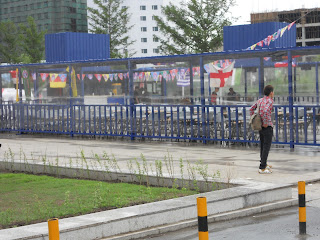Hi all
Sorry for the decreasing
rhythm these last weeks, but I begin to be relatively busy at work with a big
project beginning soon.
I already
announce, next time I will tell you about the coming government which is on the
point to emerge after conclusion of the post-electoral negotiations.
But today, I
just want to complain about roads in UlaanBaatar.
Just to start with
this pictures of a typical road.
So you understand
that to preserve your dampers you have to slalom a little bit. What can be OK
when it is a one way street, but problematic if it is a 2 or more ways street.
Add
to that a natural tendency to go and see afterwards if it was OK to go (if you
want to cross a street you can’t wait for the street to be clear, otherwise you
never move, you have to go and then see how you can survive and reach the other
side of the street), cars with steering wheel either on the right or on the
left (while driving on the right), and a crucial lack of traffic lights and you
get UlaanBaatar traffic: a real mess.
Actually it is
preferable not to have too many traffic lights since people have a tendency not
to respect them, it does not create false expectations.
I am really
surprised, I have not seen any accident yet. Actually, and I guess it is
how local drivers save their life, they kind of abuse of their klaxon. Tuuuuuuuut
“I am behind you” Tuuuut tuuuut “I am on your side” Tut tut tut tut tut “Are
you going to move?”.
Fortunately all cars are automatic so you don’t need to
listen to your engine and can pay attention to all the indications other drivers
around you give. It is almost like the “Google car”, which combines visual and “sonar”
information to guide itself.
Funny detail: It is not rare
to came across cars with a kind of klaxon extinction, after having honked
too much.
But of course
for pedestrians or just random people who like to keep their windows open, it is
a real nuisance. But it also save you sometimes so you cannot forget it.
Also another
major problem of UlaanBaatar loopholes and more generally the condition of the
streets, are the consequences of our weekly storm, which transform a simple
ride in the city in a kind of rally-raid.
It is the same for pedestrian and you are obliged to calculate more and more complex strategies to make your way
dry feet among all the huge puddles
Ok sorry for this post which was just about complaining. I start again to be positive next time :)
















